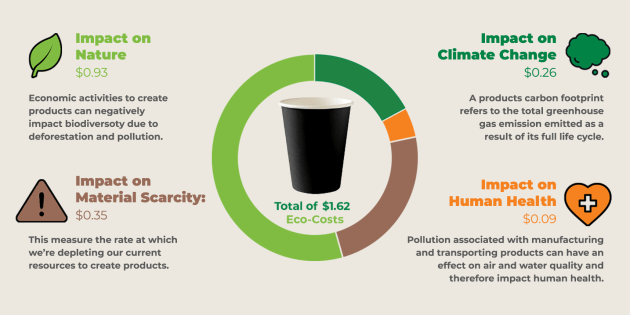In an Australian and industry first, BioPak has launched its new Environmental Impact Label, which is designed to increase transparency and accountability as part of the company’s commitment to combating industry-wide greenwashing.
In partnership with environmental impact calculation software Pickler, the new tool uses clear and accurate data to outline the eco-costs associated with each BioPak product (calculated per carton) and aims to make sustainable decision-making as easy as possible for customers in the food service sector.
The concept of eco-costs is an easy and practical guide that places a monetary value on the environmental costs of a product, and goes beyond simply measuring carbon emissions, using four key categories – impact on climate change, impact on nature, impact on human health, and impact on material scarcity.

BioPak says this is not to be confused with a hidden fee or added cost and has no impact on price.
“Since we began, BioPak has held a strong commitment to transparency, accountability and addressing the challenges of sustainable packaging. Now, we are taking it one step further,” said Gary Smith, CEO of BioPak.

“We are proud to partner with Pickler and their world-class software to show in-depth details about the environmental costs to make, transport and facilitate end-of-life solutions for that particular product.
“With credible calculations, we can make informed business decisions and pinpoint the areas with the highest impact. It also empowers our customers, allowing them to compare our product range and report on their business impact too.”
According to Smith, vague sustainability claims are no longer good enough.
“There’s a growing demand for impact data to substantiate claims, based on scientific evidence,” he added.
“Many companies are tunnel-visioned on CO2 and we want to urge these businesses to go beyond this metric, accounting for many other important impact categories that often get disregarded.”
Koen de Beer, co-founder of Pickler, commended BioPak on its leadership and commitment to transparency.
“Our purpose and goal is to easily calculate the environmental footprint of packaging, and we are delighted to partner with BioPak to help the team get one step closer towards a world without waste,” said de Beer.

“Our hope is that BioPak can set a precedent and example of what is possible, encouraging other businesses to drive change in the Australian market, and on a global scale, and to step forward and see a more sustainable way of doing business.”
According to the company, only two per cent of packaging manufacturers and resellers have proof to support their sustainability claims, highlighting an industry that’s rife with greenwashing.
A recent survey by McKinsey & Company shows that 75 per cent of organisations have made clear sustainable packaging commitments, but fewer than 30 per cent are well prepared to meet regional requirements, much less internal aspirations.
“Greenwashing does nothing but hinder and hold back innovation and progress,” said Smith.
“We genuinely hope that our Environmental Impact Label can drive significant and meaningful change in the industry, setting the benchmark for how we can all do better and champion transparency.“
The new feature is available on every BioPak product page, where customers can click through to a detailed report that includes the product’s carbon footprint, eco-costs, eco-score, and a detailed life cycle assessment.
Long-term, the future of eco-costs have the capability to not only be used as a guide to drive decision-makers for customers, but also to be a significant benchmark for the wider industry and beyond to invest in prevention costs to reduce impact.
Take a look at the explainer video below, and for further details, visit the website here.





